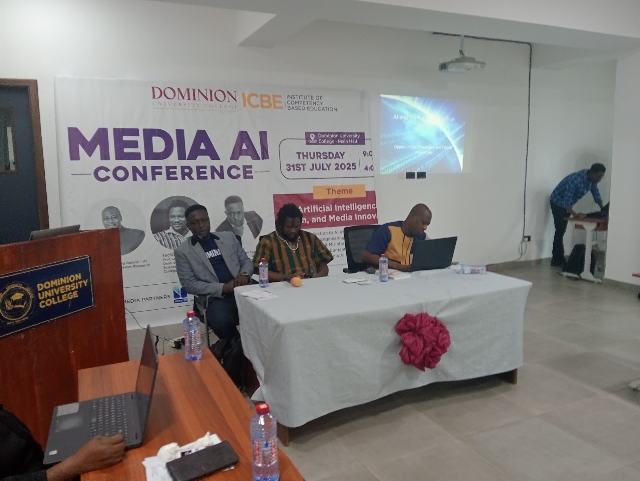Prof. Kester Quist-Aphetsi champions AI adoption at inaugural DUC media AI confab
 Prof. Kester Quist-Aphetsi (middle)
Prof. Kester Quist-Aphetsi (middle)
Prof Kester Quist-Aphetsi, Chair of the National Cyber Intelligence and Cyber Defence Research Project, delivered a thought-provoking keynote address at the inaugural Media AI Conference, organised by the Institute of Competency-Based Education (ICBE) under Dominion University College in the Greater Accra Region.
Held under the theme “Artificial Intelligence, Truth, and Media Innovation,” the event convened over 30 journalists, media professionals, and industry stakeholders to examine the transformative role of AI in governance, security, education, and economic development.
In a candid interview, Prof. Quist-Aphetsi sought to allay public fears about AI’s disruptive potential, portraying it instead as a driver of progress and productivity.
“AI is not evil; it’s here to make work easier, enhance understanding, save time, and boost productivity,” he said.
Drawing parallels with agricultural mechanisation, he noted, “Just as tractors replaced hoes to farm hectares instead of plots, AI will automate mundane tasks, freeing humans to focus on higher-value work.”
While acknowledging that AI may lead to job displacement, he emphasised that it will also generate new roles and industries, urging governments to develop forward-looking policies that facilitate AI adoption for national and regional competitiveness.
Prof. Quist-Aphetsi called on policymakers to position Ghana as a hub for AI innovation in West Africa. Citing Google's $37 million AI investment in Africa and local initiatives such as the AI Community Centre in Accra and the rollout of 100,000 Google Career Certificates for Ghanaian students, he stressed the need for public-private partnerships to accelerate digital transformation.
“We must embrace new technologies and forge partnerships to share knowledge and accelerate development,” he said.
He further recommended that AI policies prioritise integration in sectors like agriculture, healthcare, and governance to ensure “sustainable profitability and regional influence.”
The professor also highlighted the importance of education and collaboration, commending projects like the Masakhane African Languages AI Hub for leveraging AI to preserve indigenous languages.
He praised Dominion University’s ICBE for helping bridge the AI skills gap by organising practical workshops on prompt engineering, deepfake detection, and AI-assisted content creation.
“We must equip our workforce with AI literacy to compete globally,” he added.
The one-day intensive conference featured five focused modules designed to upskill participants in the use of AI for journalism:
Introduction to AI in Media
– Overview of AI concepts and ethical implications in journalism.
Prompt Engineering and ChatGPT
– Practical training on AI chatbot usage for content creation and interviews.
Deepfake and Misinformation Detection
– Tools and techniques for identifying and countering fake news and media manipulation.
AI Tools for Content Creation
– Demonstrations of AI platforms for automated writing, video editing, and visualisation.
Building a Media AI Toolkit
– Curated resources for integrating AI into media workflows and forecasting future trends.
Prof. Quist-Aphetsi’s address sparked vibrant discussions on the ethical use of AI and the future of journalism in an AI-driven world.
His concluding remarks captured the spirit of the gathering:
“AI’s potential is boundless; let’s harness it to shape Africa’s future.”
Source: Classfmonline.com/Cecil Mensah
Trending News

Abbossey Okai Spare Parts Dealers threaten closure of foreign-owned shops by Sept. 1
11:35
Bawumia outlines his vision for Ghana, as he files nomination to vie for NPP flagbearer
11:38
Educationist calls for reforms to end double-track and examination malpractices
07:36
Energy Minister calls for stronger regulatory framework in petroleum downstream sector
14:53
NDC is a peaceful party; we don’t need violence to win the Akwatia seat –Osman Ayariga
09:06
Dr. Bawumia files nomination for NPP 2028 presidential primary today
09:45
Anti-galamsey task force seizes excavator in Adobewura operation
07:26
WAEC calls for installation of cameras in exam centres to curb malpractice
12:09
U.S., Ghana explore stronger health collaboration
09:00
E/R: Rehabilitation works begin on Koforidua-Suhum road to ease commuters’ plight
09:10




